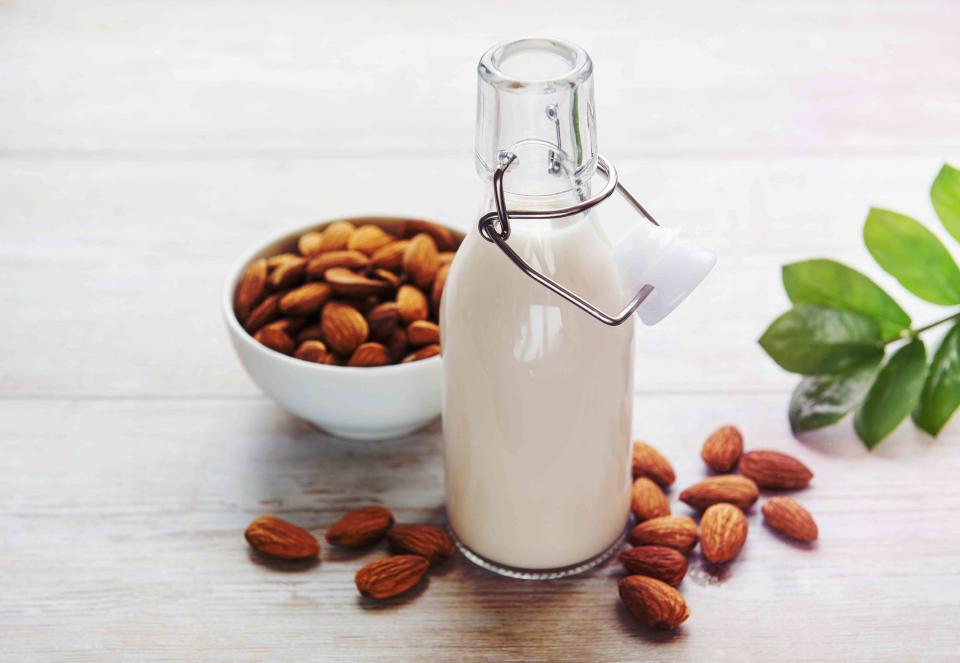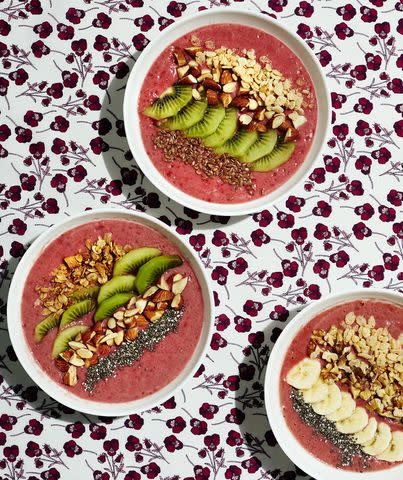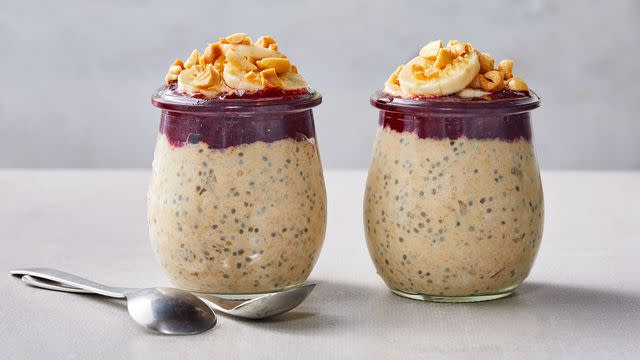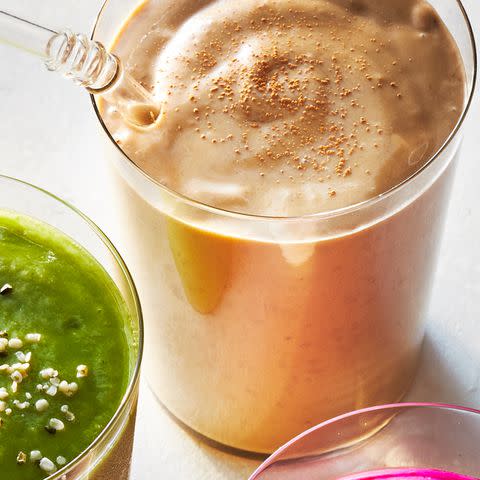9 Health Benefits of Almond Milk, According to RDNs
It doesn’t have quite as much protein as cow’s milk, but almond milk is rich in other nutrients your body craves.

Nichifor Grigore/Getty Images
Fact checked by Emily PetersonMedically reviewed by Kristy Del Coro, MS, RDN, LDN
While French Toast Crunch cereal and low-rise jeans were gaining popularity in the early 2000s, almond milk was right there along with them. Unlike some other turn-of-the century fads, however, almond milk’s popularity has only increased over the years, steadily growing as one of the most reached-for non-dairy milk substitutes on the shelf. The neutral flavor of almond milk has made it the perfect substitute for cow’s milk in both savory and sweet applications, keeping it a long-time consumer favorite.
But in terms of health benefits and nutritional value , how does almond milk measure up to cow milk? We’re breaking down all the health benefits you can count on almond milk for, as well as some delicious ways to integrate it into your everyday routine.
Related: These Are the Healthiest Milk Alternatives, According to a Dietitian
Health Benefits of Almond Milk
It’s loaded with vitamin E.
“Almond milk offers up vitamin E, which has powerful antioxidant effects,” says Bianca Tamburello, RDN, at Fresh Communications. As an antioxidant, vitamin E helps the body to fight off free radicals, or harmful molecules that can spark illness throughout the body. It can also help boost both your eye and skin health.
In fact, when it comes to vitamin E content, almond milk really blows cow’s milk out of the water. While cow’s milk contains little to no vitamin E in its natural form, almond milk can offer 50 percent or more of your daily vitamin E needs, depending on the brand and serving size.
It can be a great source of vitamin D
While not every brand of almond milk will be fortified with vitamin D, most are these days—as are many dairy brands—and you can ensure your almond milk is by looking at the packaging and nutrition label. This fortification is welcome as there are very few natural food sources of vitamin D, and for those of us living in the northern part of the country, it can be nearly impossible to meet our daily needs through sun exposure. Vitamin D plays a critical role in the absorption of calcium, helping us to grow and maintain strong bones, among other key functions.
It’s often fortified with calcium for healthy bones.
Speaking of bones, most almond milk varieties are typically fortified with calcium as well, these days. This is great news for those that don’t tolerate or choose to consume dairy, as they won’t miss out on the important benefits of calcium naturally found in cow’s milk (and other dairy foods). When purchasing almond milk at the store, peruse the packaging, ingredients label, and nutrition facts panel to make sure the brand you’re after is fortified with calcium.
Related: 9 Cheeses You Can Eat Even If You're Lactose-Intolerant
It can be a good source of vitamin A.
Vitamin A is an important micronutrient involved in several key functions throughout the body. You may be familiar with its role in supporting healthy eyes and vision, and it's also crucial for healthy skin and bones, as well as a strong and functional immune system. If you're choosing almond milk that's been fortified with vitamin A, you're already on your way to hitting your daily needs. Check the ingredients list on the carton to make sure.
It’s rich in antioxidant plant compounds.
Because almond milk is, of course, made from almonds (a superfood in their own right), every glass will give you a healthy dose of plant compounds. Almonds are full of antioxidant-rich plant compounds, including quercetin and kaempferol, which help to boost our immune systems by squashing inflammation throughout the body.
It has key nutrients for healthy growth and development.
Again, depending on the brand, almond milk may also be fortified to provide lots of other healthy micronutrients including iron, copper, magnesium, vitamin B12, potassium, and phosphorus! These vitamins and minerals will help your body with healthy growth and development, blood cell formation, energy metabolism, and fluid balance.
It’s a great vegan milk alternative.
“Almond milk is a nutritious dairy alternative that can easily fit into most diets, including lactose- and dairy-free, vegan, and plant-based [diets],” Tamburello says. Whether you follow one of these diets or avoid animal products for any other reason, almond milk allows you to still enjoy favorites you love: a bowl of cereal, baked goods, and tons more culinary ventures in the kitchen that would normally require animal-based milks.
Related: 7 Allergy-Safe Food Swaps for Those With Food Allergies
It's easier on the stomach for lactose-sensitive folks.
People often wonder if almond milk is generally better than dairy milk for their stomach and digestion. Not everyone needs to switch to a non-dairy alternative—but if you're lactose-intolerant or lactose-sensitive, yes, almond milk will be the friendlier choice for your stomach.
"Whether almond milk is better for the stomach than cow's milk depends on the individual's ability to produce lactase, the enzyme needed to break down the lactose found in cow's milk," explains Kathleen Garcia-Benson, RDN, CSSD, LD, NASM-CPT, registered dietitian with Top Nutrition Coaching, specializing in PCOS/women's health, sports nutrition, and digestive health. "For those lacking lactase, almond milk might be a more comfortable option due to its lactose-free nature. Almond milk’s lower protein content and different fat composition can also make it more digestible for some people."
It is naturally low in carbohydrates and calories.
If you need to watch your carbohydrate or calorie intake for any reason, whether it be for managing diabetes or another health condition, almond milk can be a great choice over dairy milk. One cup of unsweetened almond milk has around 40 calories and 1 gram of carbohydrates compared to the 100 to 150 calories and nearly 13 grams of carbohydrate of cow’s milk. Though these differences may seem small, to those keeping an eye on these specific nutrients for their health, especially carbohydrates, it can make a difference, namely because almond milk won’t spike blood sugars in the same way nonfat cow’s milk can (as long as you opt for low- or no-added-sugar almond milk options).
Including Almond Milk Into Your Daily Routine
Almond milk can easily fit into your daily routine as it’s such a comparable flavor replacement for dairy. If you plan to use almond milk in savory dishes like creamy sauces, pasta dishes, or soups, make sure to buy an unsweetened, unflavored variety. On the subject of sweetener, Tamburello adds, “it’s important to note that both flavored and unflavored almond milks can have added sugar.” Added sugar promotes inflammation in the body, so if you love vanilla almond milk in your morning latte, that’s totally fine, just try to find an unsweetened brand or one with as little added sugar as possible to moderate your daily sugar consumption.
Be extra careful not to serve almond milk or dishes made with almond milk to anyone with tree nut allergies.
Related: Between Dairy and Non-Dairy Yogurts, These Are Your 6 Healthiest Options, According to New Research
How to Make Your Own Almond Milk
Another fun bonus of almond milk is that you can actually make it at home for a fraction of the price of store-bought almond milk. Doing so will also help you avoid any added sugars, flavorings, or other preservatives that you may be trying to steer clear of. There are so many ways to make almond milk at home, whether you invest in a fancy nut milk maker, like Almond Cow, or simply whizz up some almonds and water in the blender and strain it through cheesecloth.
DIY Almond Milk Steps:
Blend 1 part almonds to 4 parts cool water in a blender until smooth.
Strain through a nut milk bag or cheesecloth.
Store the leftover almond meal in the freezer for the perfect addition to baked goods, oatmeal, and smoothies.
Making almond milk at home can also help you to reap more health benefits from the almond itself by using raw, unsalted almonds with the skins on. However, one notable downside to making your own almond milk at home, however, is that it won’t be fortified with vitamin D or calcium, so you’ll need to get those micronutrients elsewhere in your diet.
Related: Oat Milk vs. Almond Milk: Which One Is Healthier?
Recipes With Almond Milk
Raspberry Smoothie Bowl

Treat yourself to a colorful smoothie bowl worth taking pictures of. Whirl raspberries, bananas, almond milk, honey, vanilla, and cinnamon in the blender until smooth, but still thick enough to enjoy with a spoon. Top with your favorite healthy additions—we love sliced bananas, chopped kiwi, crushed almonds, chia seeds, or unsweetened coconut flakes.
Spiced Vanilla Almond Milk

Cozy and fragrant, this warm, frothy milk starts with unsweetened almond milk that's layered with cinnamon, nutmeg, a dash of maple syrup, and vanilla. Serve it after dinner as a healthy dessert or before bed as a warming, sleep-inducing sip.
Creamy Date Shakes

You will not believe there are zero added sweeteners in this luxurious smoothie. Blend Medjool dates, almond milk, cinnamon, hemp seeds, and ice together for the creamiest, dreamiest answer to your milkshake cravings.
Mocha Smoothie

Fred Hardy
If you need your morning coffee to do more for you than satisfy a caffeine need, this is the smoothie for you. Strong cold-brew meets the gentle sweetness of dates, bananas, and maple syrup, combined with almond butter and almond milk for a dash of protein, nuttiness, and creaminess.
PB&J Overnight Oats

Whisk together almond milk, yogurt, peanut butter, honey, vanilla, and rolled oats then refrigerate overnight. All you need to do in the morning is wake up and grab a jar of this ready-to-go breakfast.
Coffee-Tahini Smoothie

This thick and satisfying smoothie gets a triple fix of creaminess from almond milk (swap that for the oat mentioned in the recipe), banana, and avocado.
Chai Hot Toddy

This spiced hot toddy riff is about to be your new favorite fireside drink. Blend frothed almond milk with black tea, sweet spices, and a dash of dark rum.
Frequently Asked Questions
Is it good to drink almond milk every day?
“Consistent consumption of almond milk isn't typically concerning and can be part of a balanced intake, especially because it’s often fortified with calcium and other micronutrients,” Garcia-Benson says. If almond milk is your daily milk of choice, that’s great, there’s no need to change your routine.
Is almond milk the healthiest milk?
As Garcia-Benson explains, the concept of something being “the healthiest” is completely “context-dependent.”
“The best choice varies based on individual needs and circumstances,” she says. “For instance, cow's milk might be more healthy for babies over one year due to its nutritional composition—it’s rich in fat, protein, and micronutrients. Similarly, almond milk wouldn't be suitable for someone with a tree nut allergy. Almond milk, however, offers a valuable and healthy alternative for those seeking a dairy-free option with minimal downsides.” She also notes that almond milk provides less protein than traditional cow’s milk, so if you love almond milk, you’ll need to get the protein you’d otherwise be getting from regular milk elsewhere.
Is almond milk better for your stomach than cow milk?
As with above, this is varies from person to person. People with lactose intolerance or a dairy sensitivity will find almond milk easier on their stomach. “For those lacking lactase [the enzyme needed to break down the lactose found in cow's milk], almond milk might be a more comfortable option due to its lactose-free nature," Garcia-Benson says.
Are there any potential side effects or dangers of drinking almond milk?
“The primary concerns with almond milk consumption would be for those with allergies to tree nuts and its inadequacy as an [exact] nutritional substitute for cow's milk,” Garcia-Benson says. Unless you’re allergic to almonds, it is not harmful, but understanding that it does not provide a one-to-one replacement nutritionally to cow’s milk is important. For example, “it doesn't provide the necessary nutrients for infants to drink on a consistent basis,” she explains.
What are the benefits of almond milk for women?
For the most part, the benefits of almond milk apply to the general population, not just to women, Garcia-Benson notes. That said, she does add that since almond milk is often fortified with calcium, it can be a great source of this key mineral, especially for women struggling to meet daily calcium needs. “This makes it a viable option alongside other calcium-rich foods like dairy products, dark leafy greens, small fish with bones, beans, nuts and seeds,” Garcia-Benson says. Another tip: “Be sure it’s properly shaken to distribute its contents!”
For more Real Simple news, make sure to sign up for our newsletter!
Read the original article on Real Simple.


